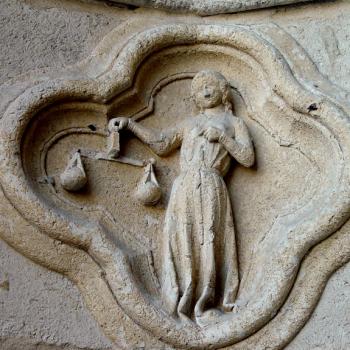
To non-Christians, the way many Christians act in the world must confuse them. For they often have read what Christ taught and see that Christians not only act contrary to Christ’s teachings, but demand others to do so as well. They read Christ teaching the way of love. They see he is meant to be the prince of peace. Yet, Christians, as history shows, have been far from peaceful, as they have engaged wars of aggression, and they have been far from loving, as they have sought to gain dominance and control over others (such as through colonialization and slavery). Christians, moreover, seem to love controversy, seeking it out, when they think they can benefit from it, but then they complain and act surprised when they are confronted for their unloving actions.
Christians have been shown the way. They have been told to turn the other cheek, to die to the self, to forgive others even as they have been forgiven. They are called to seek the lost, to dine with them, to love others instead of judging them. Yes, they are to confront injustices in the world. Yes, they are to speak out against those who would cause harm to others, but that often means, they should be speaking out against their fellow Christians, as their fellow Christians are often the ones who are causing pain and sorrow. And, when they speak and act in this way, they must always do so with love, looking for and promoting the common good, including the good of those who have done wrong. Sadly, many Christians do not do so. They are especially cruel to non-Christians, but as their way of dealing with non-Christians is anything but loving, whatever piety they use to justify themselves is, as Paul would say, just like the clanging of gongs.
Christians should be conscience of their own actions; they should judge themselves, looking for how far they have departed from the way of Christ, from the way of love, and repent, making restitution to those they have unjustly hurt or wounded. Christians should listen from Abba Matoes when he said that they should resist the inclination to create problem in the world:
A brother said to Abba Matoes, ‘Give me a word.’ He said to him, ‘Restrain the spirit of controversy in yourself in everything, and weep, have compunction, for the time is drawing near.’[1]
Christians are to weep – blessed are those who weep for their sins, for their shortcomings, for the way they have caused confusion, pain, and sorrow in the world, for in and through such weeping, they will recognize their failing and hopefully work to make things better. Christians should be seeking to be in harmony with others. They should be lifting up those in need. They should be making sure the structures of sin, especially those they contributed to, are overcome, and those hurt by such structures receive what they need to recover from the harm they have suffered. Christians should know their time in the world is short, for life is short, and the end is always coming. They should always live in the world, embracing their life, while being attentive to the coming end so that they can help mediate eschatological grace in the world.
This is not easy. Christians will have to deal with their own inordinate passions, their own inordinate desires, throughout their lives. Every time they falter, they should not despair, but they should recognize their failure and repent, being sorrowful of their failure while embracing the eschatological grace given to them, knowing that in and through it, they have a reason to hope that their metanoia will lead them to perfection. But, they must also understand, it is going to be a long process, that they should not expect immediate perfection, no matter how hard they push themselves at the beginning of their journey. It is important to slowly build themselves up instead of trying to hard and then giving up, which is why Abba Matoes said: “ I prefer a light and steady activity, to on that is painful in the beginning but is soon broken off.”[2]
As the saying goes, slow and steady wins the race. Christians should be patient with themselves, not thinking that at the beginning of their spiritual journey, or even at anytime during their temporal existence, they will be able to imitate the saints at their best. They should pursue their own perfection in a way which meets with their own personal needs, in a way which deals with the time and place in which they live. If they are not called to asceticism, they should not be expected to engage all the strict, rigorous activities various ascetics are known for – but of course, the ascetic saints have often told us this, if we have only paid attention.
The key to the Christian life is love. Through such love, they should restrain their pride, their vainglory, that is, their ego. Through it, they will exorcise their false self, the one sin constructed for them, allowing them to find their true self, the person they are meant to be in Christ. They will realize that their true personality must, in its own way, imagine, that is, reflect, divine love, because they are made in the image and likeness of the God who is love. If they live their lives as lovers, instead of egomaniacs, they will dispel inordinate pride and vainglory, and the strife and contention which they bring. Love is patient and kind, and so Christians, likewise, must find themselves becoming patient and kind; the more they restrain the spirit of controversy, the more they stop all attempts to become self-made martyrs, complaining about the way they are treated by others, the more, then, they will have properly taken on the mantle of Christ and in doing so, live their lives the way they were meant to live them.
[1] The Sayings of the Desert Fathers. Trans. Benedicta Ward (Kalamazoo, MI: Cistercian Publications, 1984), 145 [Abba Matoes #12].
[2] The Sayings of the Desert Fathers, 143 [Abba Matoes #1].
Stay in touch! Like A Little Bit of Nothing on Facebook.
If you liked what you read, please consider sharing it with your friends and family!
N.B.: While I read comments to moderate them, I rarely respond to them. If I don’t respond to your comment directly, don’t assume I am unthankful for it. I appreciate it. But I want readers to feel free to ask questions, and hopefully, dialogue with each other. I have shared what I wanted to say, though some responses will get a brief reply by me, or, if I find it interesting and something I can engage fully, as the foundation for another post. I have had many posts inspired or improved upon thanks to my readers.













